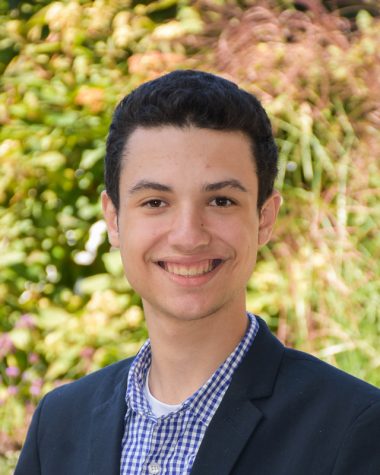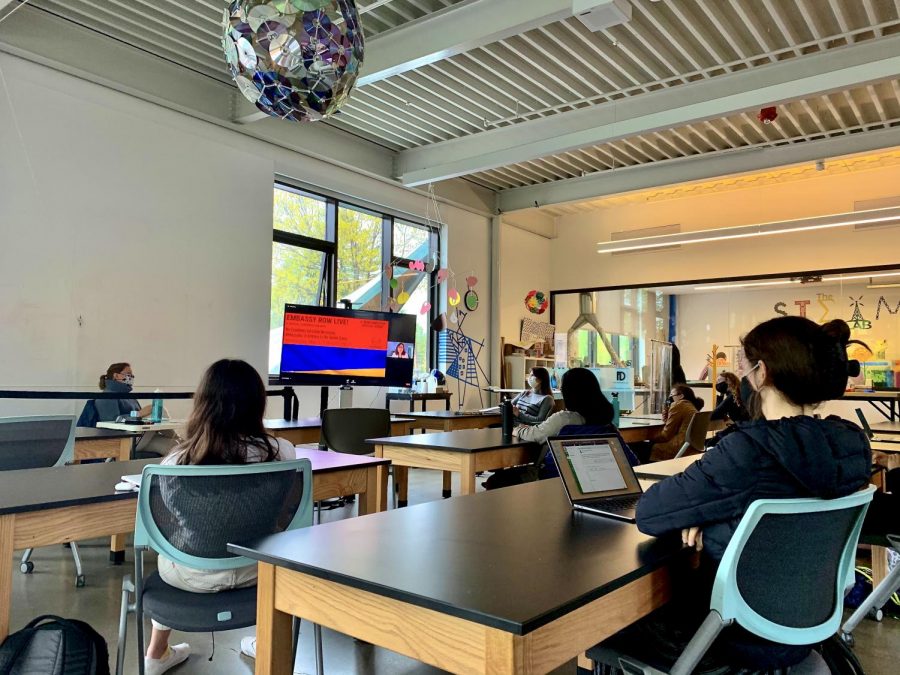Op-Ed: Examining the Ups and Downs of Zoom Events
Last May, the School attended a WorldBoston virtual discussion on Zoom.
Thanks to the Omicron surge, like last year, the School has decided to transition the Bissell Grogan Humanities Symposium to Zoom.
The decision certainly contributes to lingering Zoom fatigue, but what other choice did the School have?
Districts across the country, including Boston, have recently experienced a massive influx of COVID-19 cases and high numbers of teachers calling in sick. Here, last week Head of School Judith Guild stepped in to sub a science class due to teacher shortages.
Meanwhile, students in Denver, New York, Chicago walked out of their classrooms, demanding an online option. The Centers for Disease Control and Prevention (CDC) conducted a study in 2020, showing that distance learning contributed to a 30 percent decrease in physical activity and mental health for teens.
With all of Zoom’s downsides, however, the software has ushered in new ways of reaching special speakers from near and far.
Zoom has provided a boon for attracting high-profile speakers to campus, according to Upper School Head Joshua Neudel.
“Zoom has opened doors to speakers that we would not normally be able to have in our school,” Neudel said. “It also is sometimes easier to bring in someone that is local, because there is a lot less schedule coordination that occurs on their part. They only need to block of 40-60 minutes of their day and do not need to include travel time.”
Director of Development Elizabeth Smith agrees.
“More of our speakers are eager to say ‘yes’ because we are only asking for an hour or two of their time, versus a full day,” Smith said. “There is definitely still something wonderful about how the audience interacts with in-person speakers, and the give and take that happens. But there is also something great about having the ability to connect with experts from all over the world.”
I appreciate Smith and Neudel’s take on the ease of connecting with speakers. As the leader of the Environmental Club at School, I routinely reach out to experts via Zoom to work on a project in the city or state, or to invite speakers to educate our community.
I have helped bring in speakers like Brian Forist, an Indiana University professor on public health and leisure, and Liora Silkes, Newton’s energy coach, to inform our School’s sustainable practices. Last year, my club also hosted a panel for Earth Day on ocean health.
However, I also see Zoom as a Faustian bargain, giving and taking in equal measure.
Take last week’s keynote speaker for the Bissell Grogan Humanities Symposium, for example. The Executive Director of the Asian American Resource Workshop in Boston, Carolyn Chou, offered a tremendously informative and engaging address, “From Stopping Asian Hate to Building Asian American Community Voice.”
Still, for as many hearts and minds as Chou touched via Zoom, I can’t help but think that her physical presence on campus would have had an even greater impact. I’m in good company with my thoughts here.
“While Zoom has been great, there is a lot a benefit to sitting in front of a person and connecting with them face-to-face,” Neudel said. “In addition, the time after a presentation is often a time for students to talk one on one with a speaker, and that is lost through the video format. Overall, I believe that virtual speakers open more doors and when done properly can be very powerful.”
While I agree, I would also add that for all of its advantages, Zoom—and technology in general—can’t replicate the intimacy of an in-person event.
“We work hard to bring in speakers that understand how to speak to high school students and find ways to engage students,” Neudel continued. “Many speakers have been using a virtual format a lot, and they have honed their presentations to be effective online.”
I’m grateful to the School and the Bissell Grogan family for embracing adaptability—especially during these difficult times. After all, the community is better for having heard from Chou via Zoom than not at all.
Thankfully, Omicron seems to have peaked in Massachusetts, bringing signs of hope to events returning to normal.

Evan is passionate about saving the environment and learning geography. When he is not writing articles for The Gator, he enjoys watching and playing sports, especially baseball.





















































